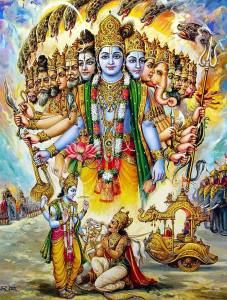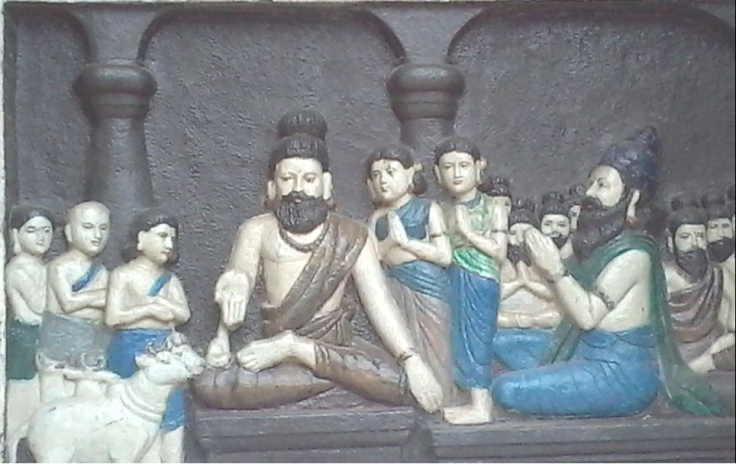Narayana Sukta is a hymn in Yajurveda which is said to be composed in 2500 BC, India
sahasra-śīrṣaṃ devaṃ viśvākṣaṃ viśva-śambhuvam |.
viśvaṃ nārāyaṇaṃ devam-akṣaraṃ paramaṃ padam ||1||
The Absolute Person (Nārāyaṇa) – the Self-effulgent Being, who is multi-headed and multi-eyed(Omniscient), who is imperishable, all-surpassing, who is manifest as various gods (celestials), who is existing in the form of the universe, who is the source of delight for the whole universe.

viśvataḥ paramān-nityaṃ viśvaṃ nārāyaṇagṃ harim |
viśvam-evedaṃ puruṣas-tad-viśvam-upajīva- ti ||2||
This universe is indeed the Absolute Being (Puruṣa); hence, it (the universe) subsists on Him. He transcends the universe (in every way), timeless, Omni form, who is the goal of the humanity (śāstra is for human beings only) the omnipresent absolute, who is the destroyer of wrong-doings and ignorance, (2)
patiṃ viśvasyātmeśvaragṃ śaśwatagṃ śivam-acyutam |
nārāyaṇaṃ mahājñeyaṃ viśvātmānaṃ parāyaṇam ||3||
He who is the Lord of the universe and the Lord (ruler) of all beings (and of course the Lord of the individual jīvas), who is timeless, auspicious and immovable, who has embodied Himself in the universe (as the causal) in the human being (being the Indweller), who is worthy of being known by the creatures, who is embodied in the universe, and who is the ultimate refuge.(3)
nārāyaṇaḥ paro jyotir-ātmā nārāyaṇaḥ paraḥ |
nārāyaṇaḥ paraṃ brahma tattvaṃ nārāyaṇaḥ paraḥ |
(nārāyaṇaḥ paro dhyātā dhyānaṃ nārāyaṇaḥ paraḥ) ||4||
Nārāyaṇa is the Absolute Light. Nārāyaṇa is the infinite Self. Nārāyaṇa is the Absolute Reality designated as Brahman.
yacca kiñcit jagat sarvaṃ dṛśyate śrūyate’pi vā |
antar bahiśca tat-sarvaṃ vyāpya nārāyaṇas-sthitaḥ ||5||
Whatsoever is there in this world known through perception (because of their proximity) or known through the report (because of their distance), all that is pervaded by Nārāyaṇa within and without. (5)
anantam-avyayaṃ kavigṃ samudre’ntaṃ viśva-śambhuvam |
padmakośa-pratīkāśagṃ hṛdayaṃ cāpyadho-mukham ||6||
He is the Limitless, Imperishable, Omniscient, the cause of delight of the world, the end of all striving, (manifest) in the space of one’s own heart, as the goal of all striving, which is comparable to an inverted lotus bud. (6)
adho niṣṭyā vitastyānte nābhyām-upari tiṣṭhtati |
jvālamālā-kulaṃ bhātī viśvasyāyatanaṃ mahat ||7||
Below the Adams apple, at a distance of a finger-span, and above the navel (i.e., the heart which is the seat of the manifestation of Pure Consciousness in the human being), is the great abode of the universe, as if adorned with garlands of flames. (7)
santatagṃ silābhistu lambatyā-kośasannibham |
tasyānte suṣiragṃ sūkṣmaṃ tasmin-sarvaṃ pratiṣṭhitam ||8||
Surrounded on all sides by nerve-currents (or arteries), suspends the lotus-bud of the heart in an inverted position. It is in a subtle space (a narrow aperture, the suṣumnā-nādi), and therein is to be found the basis of all things. (8)
tasya madhye mahānagnir viśvāracir-viśvatomukhaḥ |
so’grabhugvi-bhajan-tiṣ- hann-āhāram-ajarḥ kaviḥ ||9||
In the middle of those (narrow space of the heart or susumnā) remains the undecaying, all-knowing, omni faced, great Fire, which has flames on every side, which enjoys the food presented before it, which remains assimilating the food consumed, (9)
tīryag-ūrdhvam adhaśśāyī raśmayas-tasya santatā |
santāpayati swaṃ deham-āpādatala-mastakaḥ |
tasya madhye vahniśikhā aṇīyordhvā vyavasthitaḥ ||10||
(His) rays spread themselves vertically and horizontally, and which warms its own body from the head to foot. In the centre of that Fire, which permeates the whole body, there abides a tongue of fire, of the colour of shining gold, which is the topmost among all subtle things, (10)
nīlatoyadamadhyasthā vidyullekheva bhāsvarā |
nīvāra-śūkavat-tanvī pītā bhāsvatyaṇūpamā ||11||
which is dazzling like the flash of the lightning that appears in the middle of a rain-bearing clouds, which is slender like the awn of a paddy grain, yellow (like gold) in colour, in subtlety comparable to the minute atom, (this tongue of fire) grows splendid. (11)
tasyāḥ śikhāyā madhye paramātmā vyavasthitaḥ |
sa brahmā, sa śivaḥ, sa hariḥ, sendraḥ, so’kṣaraḥ paramaḥ svarāṭ ||12||
In the middle of that flame, the supreme self dwells. This (self) is Brahma (the creator), Siva (the destroyer), Hari (the protector), Indra (the ruler), the imperishable, the absolute, the autonomous being. (12)
ṛtagṃ satyaṃ paraṃ brahma puruṣaṃ kṛṣṇapiṅgalam |
ūrdhvaretaṃ virūpākṣaṃ viśvarūpāya vai namo namaḥ ||
Prostrations again and again to that Absolute Brahman, Who is the Truth, the Cosmic Order, the Puruṣa of blue-decked yellow (shining) hue, ever-celibate, multi-eyed (omniscient), all-pervasive.
nārāyaṇ- ya vidmahe, vāsudevāya dhīmahi, tanno viṣṇuḥ pracodayāt |
We commune ourselves with Nārāyaṇa, and meditate on Vāsudeva, may that Viṣṇu direct/propel us (to the great goal).
Om śanti, śānti, śāntḥihi
Om. May there be Peace, Peace, Peace.

![States of Consciousness [Brihadaranyaka Upanishad]](https://sagunabrahman.files.wordpress.com/2017/09/yagnavakya.png?w=600&h=379&crop=1)
